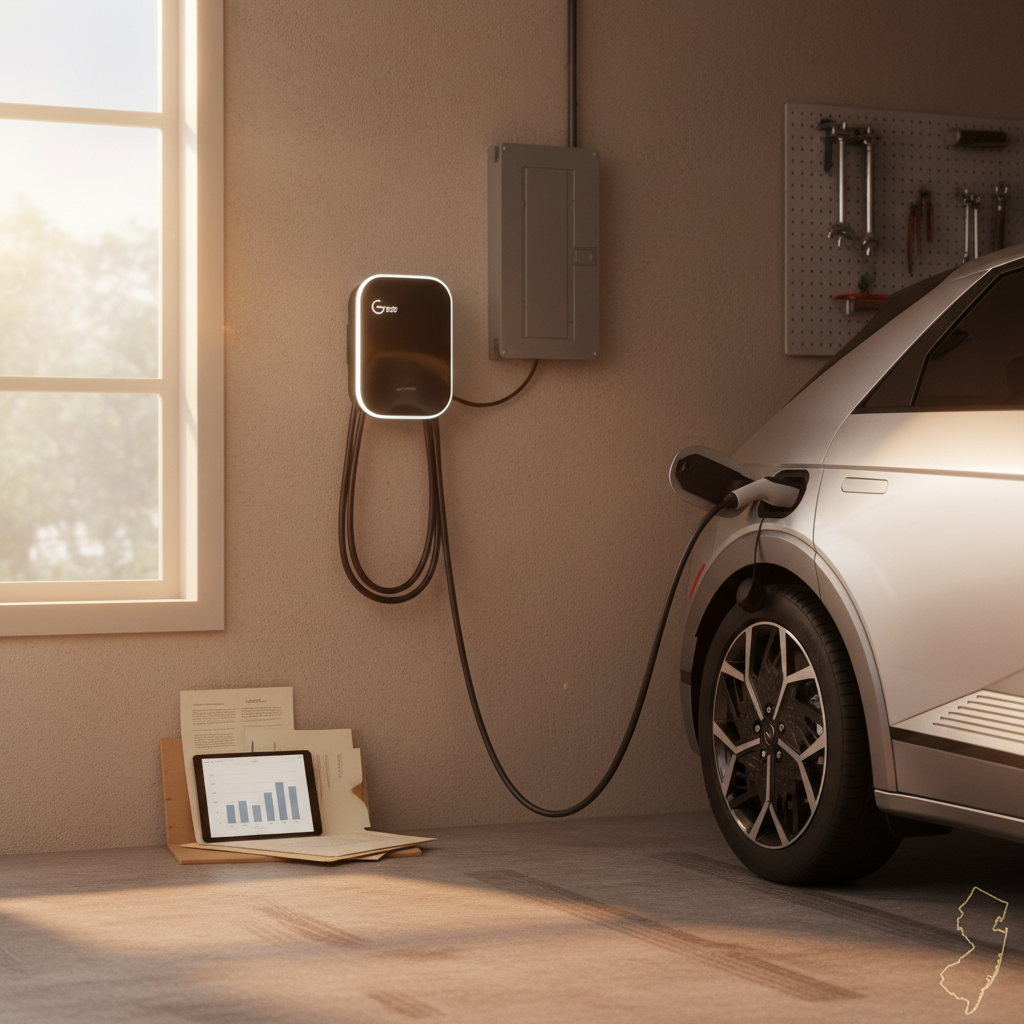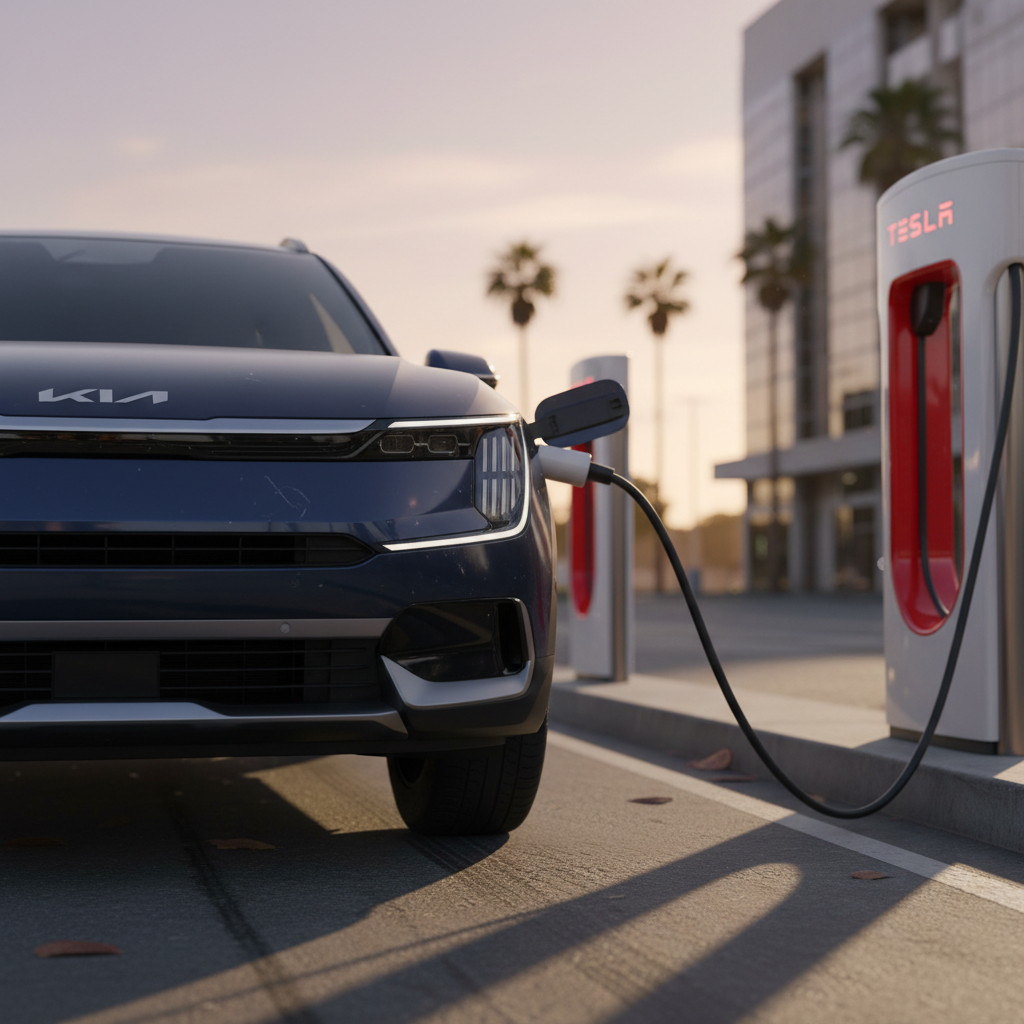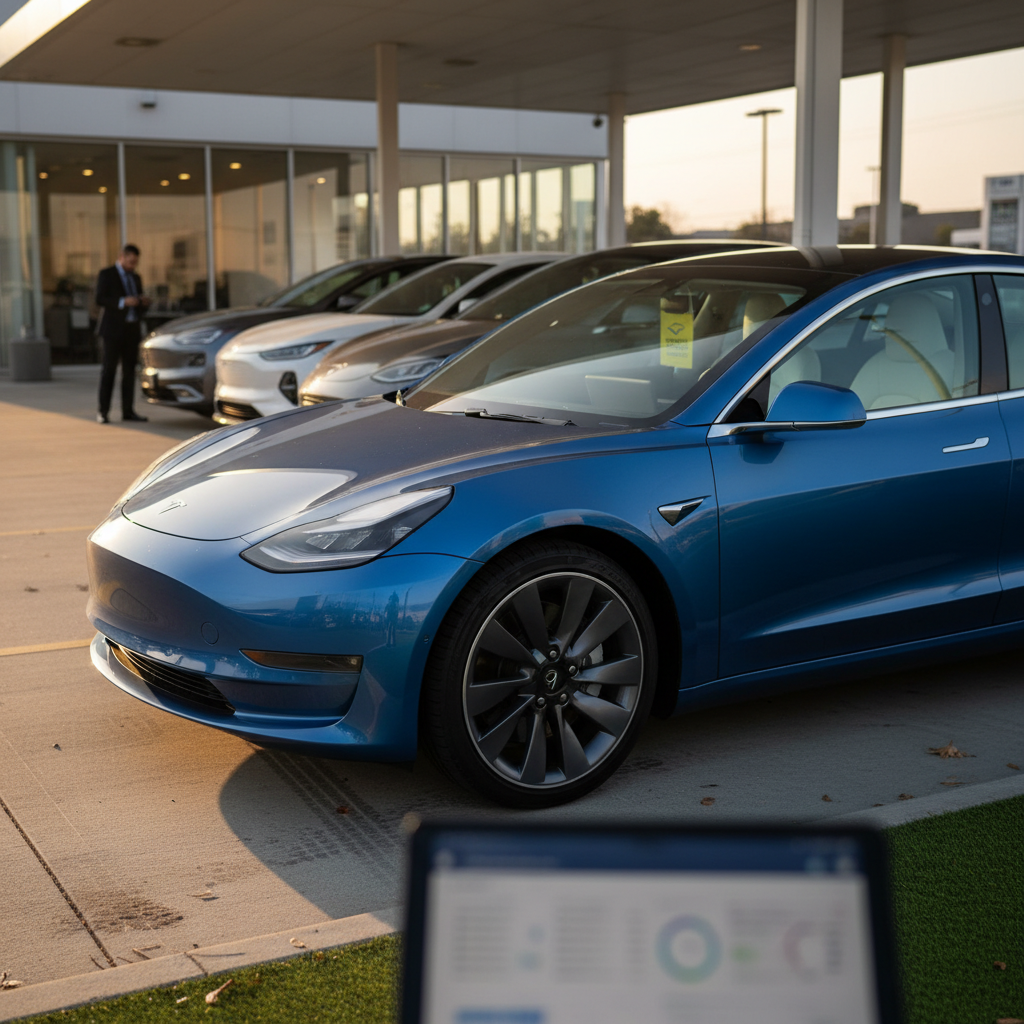If you’ve got kids, gear, or a regular carpool to cover, a three-row electric SUV is one of the most appealing ways to go electric without downsizing your life. The good news: as of late 2025 there are finally enough 3-row EV SUVs, new and used, to compare. The tradeoff: they’re not all created equal on third-row space, range, or price, especially if you’re shopping pre-owned.
At a glance
Why three-row electric SUVs are finally taking off
For the first decade of the modern EV era, most battery-electric vehicles were compact crossovers or sedans. Big three-row SUVs were considered too heavy and inefficient for early batteries and charging tech. That’s changing fast. Battery packs north of 100 kWh, 800-volt architectures, and better packaging now let automakers build full-size family EVs with usable third rows and competitive range.
Three-row electric SUV market snapshot (late 2025)
Family EV sweet spot
Quick look: key three-row electric SUVs in 2025
Popular three-row electric SUVs (U.S. market, late 2025)
High-level comparison of some of the most talked-about three-row electric SUVs. Specs and pricing are approximate and can change frequently, always verify with the manufacturer or dealer.
| Model | Seats | Est. max range (mi) | Approx. starting MSRP | Positioning |
|---|---|---|---|---|
| Kia EV9 | 6 or 7 | Up to ~300 | Mid-$50,000s | Mainstream family EV SUV |
| Hyundai Ioniq 9 | 7 | ~330 (projected U.S.) | High-$50,000s | Mainstream, tech-forward three-row |
| Rivian R1S | 5, 6 or 7 | Up to ~400 | Mid-$70,000s | Adventure / off-road luxury |
| Tesla Model X | 6 or 7 | Low–mid 300s | High-$80,000s | Performance-focused luxury |
| Volvo EX90 | 6 or 7 | Low 300s | High-$70,000s | Safety-focused luxury |
| Cadillac Vistiq | 3 rows | Around low 300s | High-$70,000s | Mid-size luxury 3-row EV |
| Cadillac Escalade IQ | 3 rows | Up to mid 400s | Low-$120,000s | Full-size luxury flagship |
| Mercedes-Benz EQS SUV | 6 or 7 | Low–mid 300s | Low-$100,000s | Luxury comfort cruiser |
Use this as a starting point; trim, wheel size, climate and driving style all affect range and price.
Specs are moving targets
Spotlight: mainstream three-row electric SUVs
If you’re cross-shopping with gas models like a Toyota Highlander, Honda Pilot, or Kia Telluride, the closest electric analogs today are Kia EV9 and Hyundai Ioniq 9. They’re sized for families, priced below most luxury EVs, and designed from day one as three-row utilities rather than stretched two-row crossovers.
Kia EV9 vs. Hyundai Ioniq 9: what to know
Both ride on Hyundai Motor Group’s latest 800-volt E-GMP architecture, but they target slightly different tastes.
Kia EV9
The EV9 helped define the modern three-row electric SUV playbook: upright stance, usable third row, and a starting price in the mid-$50,000s.
- Strengths: Value, straightforward trims, available captain’s chairs, solid range for family duty.
- Consider: Boxy shape and big wheels can eat into highway efficiency; some trims may not qualify for all tax credits.
Hyundai Ioniq 9
The Ioniq 9 leans a bit more toward tech and long-distance comfort, with slicker styling and strong claimed range.
- Strengths: Projected range of roughly 330 miles in rear-drive form, very fast DC charging, lots of driver-assist tech.
- Consider: Newer nameplate, so used inventory will be thin at first; pricing overlaps with premium brands when fully optioned.

Who should target these models
Luxury three-row electric SUVs
Move upmarket and you’ll find three-row EVs that combine serious performance with lounge-like interiors. They’re expensive, but they showcase where the segment is headed, and they’re beginning to trickle into the used market, which is where buyers on Recharged are paying close attention.
Key luxury three-row electric SUVs
From adventure rigs to rolling living rooms, here’s how the standouts differ.
Rivian R1S
The R1S is the off-road specialist of the group, with adjustable air suspension, strong towing capacity, and available quad-motor setups.
- Best for: Families who camp, ski, or off-road but still want three rows.
- Watch for: Roof racks, big tires, and cold climates can noticeably reduce range.
Tesla Model X
One of the earliest three-row electric SUVs, the Model X still offers rapid acceleration, efficient drivetrains, and access to a broad fast-charging network.
- Best for: Drivers who prioritize performance and charging convenience.
- Watch for: Falcon Wing doors add drama but also complexity; check panel fit and seals carefully on used examples.
Volvo EX90 & Cadillac Vistiq
Newer entrants like the Volvo EX90 and Cadillac Vistiq focus on safety, comfort, and a more traditional luxury experience.
- Best for: Families who want advanced driver-assistance and upscale interiors more than 0–60 bragging rights.
- Watch for: Early-build software bugs and OTA update history on used units.
Don’t forget the Escalade IQ
Range, charging, and real-world usage
On paper, many three-row electric SUVs advertise 300 miles or more of range. In reality, you’ll want margin: load up the cabin, add highway speeds, winter temps, and a roof box, and effective range can shrink. The good news is that most of these vehicles support robust DC fast charging, so longer trips are manageable with some planning.
Range: what matters most
- Look for an EPA-rated range that comfortably covers your longest regular day, then add 25–30% buffer.
- Big wheels and aggressive tires hurt efficiency; smaller wheels often add meaningful range.
- Driving 75–80 mph instead of 65–70 mph can cut range more than you expect, especially in cold weather.
Charging: not just speed, but access
- Most three-row EV SUVs support at least 200 kW DC fast charging; some reach 350 kW with 800-volt architectures.
- Home Level 2 charging (240V) is still the game-changer, plan for overnight top-ups rather than frequent fast charges.
- Check public charging coverage where you road-trip, not just where you live.
Plan around kids, not just kilowatts
Interior space: third row and cargo reality check
Every three-row electric SUV has a third row on the spec sheet. Not every third row is one you’d put adults in for more than an airport run. Battery packaging, roofline, and overall length all play roles in whether the back row feels like a real seat or an emergency jump seat.

Third-row comfort checklist for test drives
1. Try all three rows in one visit
Have at least one adult sit in every seating position, including the third row, with the second row adjusted to a realistic position for tall passengers.
2. Measure real cargo with all seats up
If you regularly haul strollers, sports gear or a large dog, bring those items to the dealership or Experience Center and test how they fit behind the third row.
3. Check child-seat logistics
Look for LATCH locations, top tether anchors, and how easy it is to access the third row with child seats installed in the second row.
4. Pay attention to visibility
Short side windows, thick pillars, and high beltlines can make kids feel claustrophobic in the third row. Sit back there yourself for a few minutes.
5. Try the folding mechanisms
Confirm that power-folding or manual seat mechanisms are intuitive and quick. In daily life, fiddly seats become a real pain point.
Don’t trust photos alone
Cost of ownership and incentives
Sticker price is the headline, but total cost of ownership tells the real story. A three-row electric SUV usually costs more upfront than a gas equivalent, but you can claw back money through lower energy costs, less routine maintenance, and, if you qualify, federal or state incentives.
Where three-row EV SUVs save (and where they don’t)
Understand the tradeoffs before you sign.
Energy and maintenance
- Electricity vs. gasoline: Even with higher power rates, home charging usually beats fuel costs for a large SUV.
- Fewer wear items: No oil changes, fewer fluids, and less brake wear thanks to regen.
Taxes and incentives
- Depending on where and how the vehicle is built, you may qualify for federal clean vehicle credits or state rebates.
- Leasing can sometimes unlock incentives even if you don’t qualify for them when buying outright.
Where costs can climb
- Tires: Heavy, powerful EV SUVs can go through tires quickly.
- Insurance: High MSRPs and advanced tech can push premiums up compared with mainstream gas SUVs.
Buying used? Look beyond the price tag
Buying a used three-row electric SUV
Because most three-row electric SUVs are relatively new, the used market is still maturing, but it’s growing quickly as early adopters trade up to newer trims and software. This is where a marketplace built around EVs, like Recharged, can give you a clearer picture than a generic used-car listing site.
Advantages of shopping used three-row EVs with Recharged
Big batteries and complex software make inspection critical.
Verified battery health
Every vehicle on Recharged comes with a Recharged Score Report, which includes verified battery health data, not just odometer readings. That’s essential for a three-row EV that might have spent its life on road trips.
Transparent pricing and EV support
Recharged benchmarks each vehicle against fair-market pricing and backs it with EV-specialist support, financing, trade-in options, and nationwide delivery, so you can cross-shop a Rivian R1S and a Kia EV9 from your couch.
Used three-row electric SUV buying checklist
1. Review battery health and fast-charging history
Ask for a battery health report and look for patterns of frequent 0–100% DC fast charging, which can accelerate wear. A platform like Recharged surfaces this data for you.
2. Confirm software and recall status
Three-row EV SUVs rely heavily on software. Make sure all recall campaigns and major software updates have been applied, and ask to see the update history where possible.
3. Inspect tires, suspension, and brakes
These vehicles are heavy. Uneven tire wear, tired shocks, or noisy brakes can signal rough use and future expense.
4. Test all seating and climate functions
Fold, slide, and recline every seat, and test rear-zone climate controls. Repairing stuck power seats or rear HVAC issues can be costly.
5. Validate charging compatibility
Confirm which connector the vehicle uses (like NACS or CCS), whether an adapter is included, and how that fits with public charging networks you plan to use.
Be cautious with unknown imports
How to choose the right three-row EV SUV
Picking a three-row electric SUV isn’t just about the badge on the grille. Start with how you actually use your current vehicle: passengers, miles, climate, and towing. Then work backward to the models that best fit that profile, new or used.
Three-row electric SUV paths: which sounds like you?
Growing family hauler
Prioritize mainstream options like Kia EV9 or Hyundai Ioniq 9 for value and space.
Look for 7-seat configurations with easy third-row access and strong safety scores.
Target trims with mid-size wheels and all-weather tires instead of the biggest wheel packages.
Adventure & towing
Consider Rivian R1S or similar adventure-focused SUVs with real off-road hardware.
Check tow ratings and whether range estimates include towing penalties.
Make sure your charging plan covers trailheads, ski areas, and national parks you actually visit.
Luxury commuter & client shuttle
Focus on comfort, noise isolation, and driver-assistance tech in models like Volvo EX90, Tesla Model X, or Cadillac Vistiq.
Test advanced driver-assist features on real roads, not just around the block.
If you’re driving clients, pay attention to second-row legroom and interior materials.
Budget-conscious upgrader (used)
Cross-shop 2–4-year-old examples of three-row EVs; depreciation can be your friend on luxury brands.
Use tools like the Recharged Score to balance price against remaining battery and warranty life.
Be flexible on color and options to focus on vehicle condition and history.
Think in ownership years, not months
FAQ: three-row electric SUVs
Frequently asked questions about three-row electric SUVs
The bottom line
Three-row electric SUVs have gone from science project to serious contenders in just a few short years. Whether you gravitate toward a value-focused Kia EV9, an adventurous Rivian R1S, a tech-heavy Hyundai Ioniq 9, or a luxury flagship like the Escalade IQ, you can now find an electric family hauler that fits real-world life, not just a spec sheet.
The key is to shop with your actual needs front and center: third-row usability, charging access, range with a full load, and long-term ownership costs. If you’re looking at the used market, lean on tools like the Recharged Score Report, EV-focused inspections, and transparent pricing so you know exactly what you’re getting. Do that, and your next three-row SUV could be the one that finally lets your whole family go electric, without compromising on space, comfort, or confidence.



